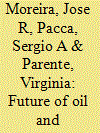|
|
|
Sort Order |
|
|
|
Items / Page
|
|
|
|
|
|
|
| Srl | Item |
| 1 |
ID:
119826


|
|
|
|
|
| Publication |
2013.
|
| Summary/Abstract |
Since 2004, the Government of Brazil (GoB) has acted as an intermediary between distribution and generator companies in the energy procurement sector. The GoB procures energy from generator companies through auctions of long-term energy contracts. After an auction, the winning generator companies sign contracts directly with distribution companies. In particular, the GoB runs two different auctions: one for energy from existing power plants (i.e., old energy) and another for energy from power plants that have not yet been built (i.e., new energy). This paper describes these auctions and compares the outcomes from the old and new energy auctions from 2004 to 2010 using final auction prices. The Brazilian case is particularly interesting, not only because energy is predominantly supplied by hydropower plants but also because new energy auctions reach prices below those for old energy. Therefore, it is likely that it is not necessary to run the two different energy auctions. As a secondary objective, this article analyze whether the Anglo-Dutch hybrid auction model is a better design for electricity procurement in Brazil.
|
|
|
|
|
|
|
|
|
|
|
|
|
|
|
|
| 2 |
ID:
127161


|
|
|
|
|
| Publication |
2014.
|
| Summary/Abstract |
This work compares the return on investments (ROI) of oil versus biofuels in Brazil. Although several renewable energy sources might displace oil, the country's forte is sugarcane biofuels. In our analysis we carry out simplified benefit-cost analyses of producing oil fields, pre-salt oil fields (without and with enhanced oil recovery), a business as the usual ethanol scenario, and a high ethanol scenario. Excluding the ROI from existing oil fields, which is the highest, when the discount rate is 4% or more, the ROI of the high ethanol scenario is greater than that of the ROI of pre-salt oil. Considering a US$40/t CO2 tax, the high ethanol scenario's ROI is greater than the pre-salt oil's ROI if a discount rate of 2% or more is adopted. Moreover, the high ethanol scenario throughput up to 2070 compares to 97% of the pre-salt oil reserve without EOR, and demands 78% of its investment. Pre-salt oil production declines beyond 2042 when the country might become a net oil importer. In contrast, ethanol production reaches 2.1 million boe per day, and another 0.9 million boe of fossil demand is displaced through bioelectricity, yielding a total of 3 million boe (62% of the country's oil demand).
|
|
|
|
|
|
|
|
|
|
|
|
|
|
|
|
|
|
|
|
|